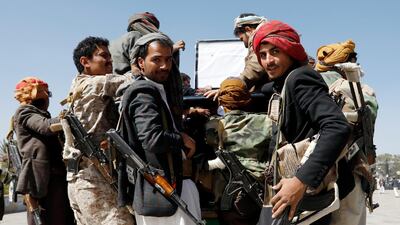The Biden administration slapped sanctions on two senior Houthi military leaders on Tuesday for prolonging the Yemen war and exacerbating the country’s humanitarian crisis.
Mansur Al Sa’adi serves as the Houthi Naval Forces Chief of Staff and “has masterminded lethal attacks against international shipping in the Red Sea," the US Treasury said.
It added Al Sa’adi “has received extensive training in Iran [and] has also helped smuggle Iranian weapons into Yemen.”
Ahmad Ali Ahsan Al Hamzi has been identified as the commander of Yemen’s Houthi-aligned Yemeni Air Force and Air Defence Forces, as well as its UAV programme. The US accuses him of acquiring Iranian weapons to use in Yemen's protracted conflict.
Fighting erupted in Yemen in 2014, when the rebel group seized Sanaa and much of the country’s cities in the north. A Saudi-led coalition intervened in 2015 on behalf of the internationally recognised government of Yemeni President Abdrabu Mansur Hadi to power.
Both sanctioned men have received training in Iran according to the US statement, and are responsible for "orchestrating attacks by Houthi forces affecting Yemeni civilians, bordering nations, and commercial vessels in international waters.”
The measures are the first by the Biden administration against the Houthi rebels and draw a direct link between the group and Iran.
“These actions, which were done to advance the Iranian regime’s destabilising agenda, have fuelled the Yemeni conflict, displacing more than one million people and pushing Yemen to the brink of famine,” the statement read.
The US accused the Iranian regime of intensifying the conflict and said the Islamic Revolutionary Guard Corps (IRGC) had provided military guidance and training to the Houthis, allowing them to “threaten Yemen’s neighbours and conduct heinous attacks damaging civilian infrastructure in Yemen and Saudi Arabia.”

On Monday, State Department spokesperson Ned Price condemned the latest ballistic missile launch by the Houthis aimed at Saudi Arabia, which was intercepted with the help of the US.
“Based on these complex Houthi attacks on Saudi Arabia, we are considering taking additional steps to promote accountability for the Houthi leadership,” Mr Price said.
Asked if removing the designation of the Houthis as a foreign terrorist organisation by the Biden administration last month was a mistake given the current attacks, Mr Price stood by the decision. “It was not a mistake to do everything we could within our power to alleviate the humanitarian suffering of the Yemeni people. Again, more than 80 per cent of Yemen’s population lives under Houthi control,” he said.
In a statement, US Secretary of State Anthony Blinken said the sanctions are in response to attacks that the Houthis have carried out on Saudi Arabia and the offensive the group is leading in the city of Marib.
“We strongly condemn the Ansar Allah’s [Houthis'] continued assault on Marib and their attacks in the region, including a complex attack on February 27, which threatened civilian areas with several [unmanned aerial vehicles] and a missile attack on Riyadh. Again, on March 1, Ansar Allah attacked the Saudi city of Jazan and injured five civilians,” he said.
Mr Blinken accused Iran of fanning the flames of the war. “Iran’s involvement in Yemen fans the flames of the conflict, threatening greater escalation, miscalculation and regional instability. Ansar Allah uses Iranian weapons, intelligence, training and support to conduct attacks threatening civilian targets and infrastructure in Yemen and Saudi Arabia,” he said.
The Biden administration has intensified its efforts to end the Yemen war. Its newly appointed envoy Tim Lenderking has made two trips to the Gulf to renew negotiations for a ceasefire in the country.


